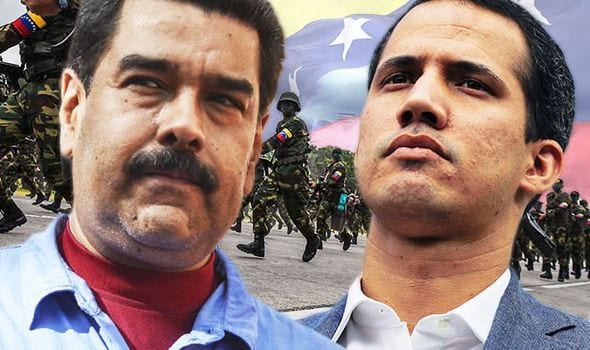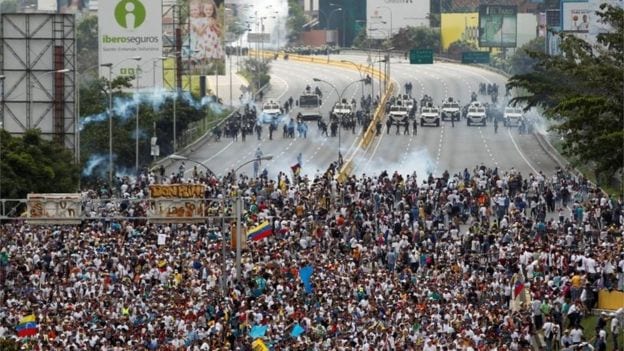
Many media outlets have been relaying the recent presidential bid by opposition leader Juan Guaidó, a fresh-faced and smiley centrist, as the catalyst to end the suffering of Venezuela. Years of corrupt governance and economic mismanagement have rendered Venezuela the sick man of South America, with its bloated hyperinflation and dire lack of essentials like medicine and food forcing an estimated three-million citizens from their homes in hope of a better life elsewhere. The west and their outlets have been quick to brand President Nicolás Maduro as a delusional despot perniciously hellbent on sailing Venezuela into perdition; as well as this, many mainstream outlets have set about craftily pointing out Russia and China’s (in other words: the bad guys) reluctance to condemn Maduro’s regime. But is this all so, or do we have an instance of history repeating itself as the situation grows ever direr?
Let’s get one thing perfectly clear: Venezuela has a ridiculous amount of oil. The South-American nation is, in fact, one of the world’s largest exporters of crude oil, 20% of the world’s global supply comes from Venezuela. However, the Venezuelan government doesn’t quite ideologically align with that of the other big oil producers (namely Saudi Arabia, Russia and the US). See, since Hugo Chavez kickstarted the Bolivarian Revolution back in 1999, Venezuela has been a socialist nation; aka ‘bad guys’ in the eyes of the Yanks. And the socialists did do great things for the nation, for a while Venezuela was the golden child of South America and an archetypal example of socialism done right. But the government was also, at times, sloppy and made some poor decisions that have subsequently bit the country in the ass in the long run. Namely relying too greatly on oil production and not diversifying the national economy.

Nevertheless, upon Chavez’s death in 2013, he appointed his successor: Maduro. Since the charismatic and beloved Chavez mortal departure, Venezuela has gone from crisis to crisis as its economy has faltered to an unbearable degree. As of now, an estimated 80% of Venezuelans are below the poverty line and the nation has a hyperinflation rate of 1.3m%. All the while, Maduro has been edging his way into authoritarian waters and is showing no interest in relieving power after winning the elections last year in a show that many declared to be rigged.
So, it’s evident: Maduro is deeply unpopular and clinging desperately to power. However, to blame the all of Venezuela’s woes solely on his incompetence is not all fair, and as satisfying as it is to look at the situation as a black and white one this simply is not the case. Venezuela and the US, namely, haven’t been on the best of terms since Chavez came to power. In 2002 the Bush administration became mired in allegations of supporting a coup against the Venezuelan government, in 2008 Venezuela expelled the US ambassador and whilst relations improved slightly under Obama it is clear that Trump every intention of backing a regime change. Trump has stated in the past that he is “not going to rule out a military option”, and with the recent oil sanctions and vocal support of Guaidó have led many experts the believe that a US-backed coup is not a matter of ‘if’ but of ‘when’.

Another aspect that is complicating the matter is Russia and China’s vested interests in Venezuela, the two titans have invested billions into nation’s economy in recent years with Venezuela’s debt to foreign creditors believed to be close to $100 billion. If a regime change does take place it is still unclear as to what happens to that debt, in fact, there’s a lot of aspects that a simple change of power won’t fix. The way I see it, Trump’s main interest in Venezuela is to secure its gargantuan oil deposits for the US, such would make sense owing to the ongoing struggle for dominance with China. And Trump’s declaration of support is, I believe, to simply draw attention away from his disastrously prolonged standoff with Congress which had sent the presidents already abysmal approval ratings into a downward spiral, with January’s reaching a record high of 55% disapproval.
Let’s get another thing clear: the US loves oil. And with this whole fiasco taking place it makes one harken back to the invasion of the also oil-rich Iraq in 2004. If Trump does decide to resort to a military solution in removing the thorn that is Nicolas Maduro, then it’s undoubtedly likely that we’ll see Guaidó be unable to keep back rampant US oil companies from swooping in and sucking up every sweet drop of oil in Venezuela à la Iraq. Trump’s sanctions have only gone on to weaken Maduro’s regime further in a move that serves only to weaken and take advantage of Venezuela: a puppet state in waiting.
All this, however, is proving to be a lovely palatable story for mainstream outlets. Just sit back and admire how Maduro and Guaidó’s opposing images have come to dominate the narrative, with the former appearing old, tired and delusional and the latter fresh-faced, optimistic and strong. And none of this is to say that I in any way support Maduro, I don’t. But at the same time, people need to see that this isn’t as simple as ‘good’ versus ‘bad’ between the Venezuelan people and Maduro’s government. Instead, this has every telling sign of being a proxy conflict between the great powers as they clamber and grasp at a weakened nations valuable assets whilst the people suffer and, most likely, will continue to suffer in every possible scenario. And if Trump does, in fact, move in to remove Maduro from power then, despite all the oil he gets, it will be yet another burden on the shoulders of America. And an irony at that considering Trump’s rampantly isolationist rhetoric that he was elected for. But for now, it seems as if everybody’s got their fingers in this pie and all are keen for a slice!

